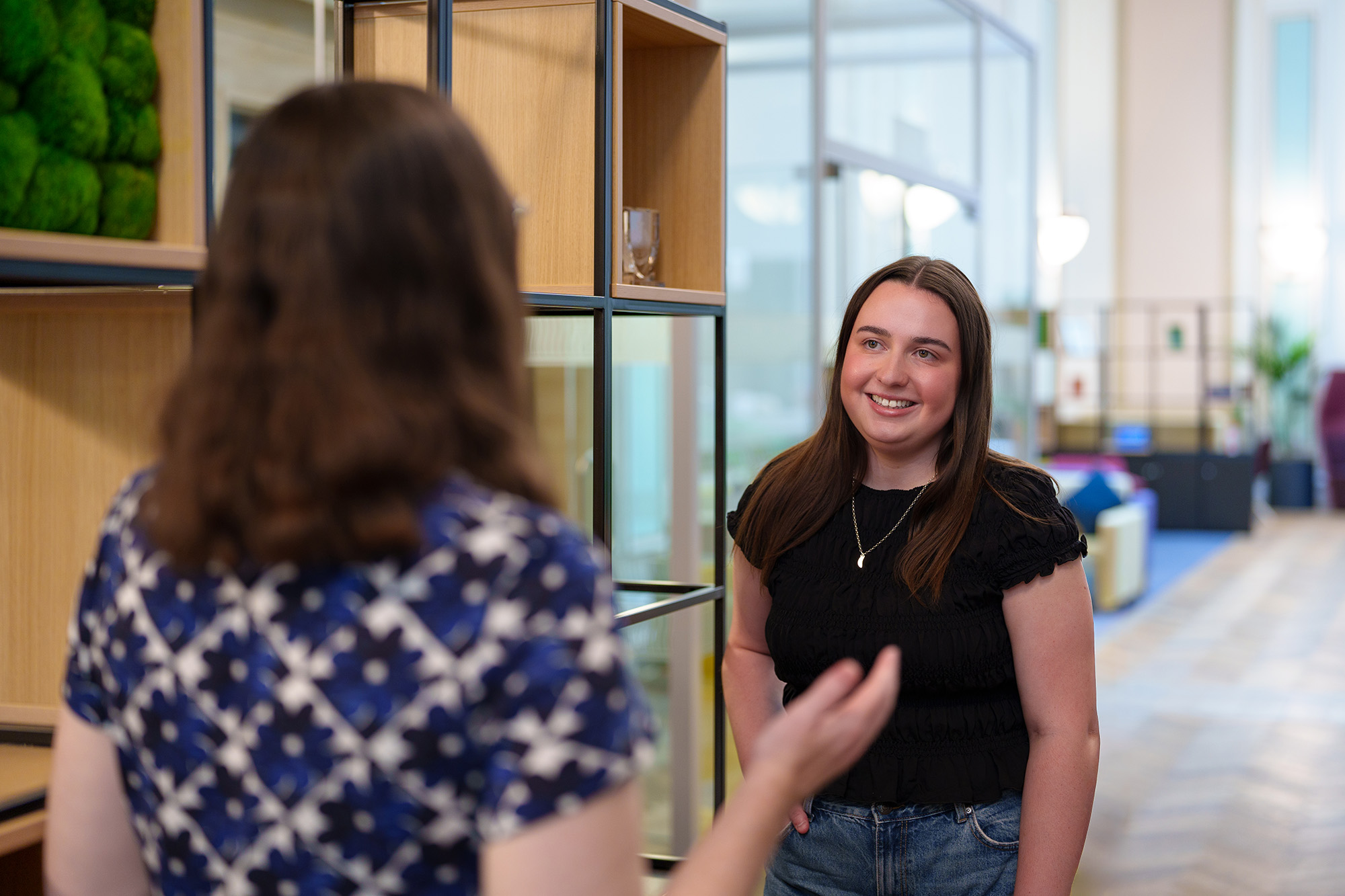Shannon joined the Tax Specialist Programme (TSP) in September 2024 following her studies in Philosophy, Politics and Economics at the University of York. Drawn to the programme by its promise of variety and continuous development, she was keen to avoid the predictability of a typical graduate role. In this blog, Shannon shares her reflections on her first year on the programme.

Daily work and responsibilities
Can you walk us through a typical day or week in your role? What does your schedule actually look like?
A typical week on the TSP involves a mix of formal learning, casework, and portfolio development. Learning includes tutor-led theory and practical sessions, peer discussions, and pre-reading. From early on, I’ve managed real cases – writing to customers, making calls, and progressing investigations. I’ve worked on Stamp Duty Land Tax and Qualifying Policy cases, and I’m currently collaborating with the Fraud Investigation Service on a live project.
Alongside this, I maintain a weekly portfolio (QAF) to track progress against performance standards. I’ve also volunteered to support work experience students, attended university careers fairs, and hosted meetings.
How do you balance training sessions and exams with actual work responsibilities?
One of the requirements of the TSP is prioritisation and self-management. For the most part, we organise our time ourselves so it’s important to plan ahead and monitor deadlines.
What kind of support or guidance have you received in your first year?
Since joining the TSP, I’ve had regular one-to-one meetings with my Business Learning Manager, which were especially helpful during my probation period. I also have ongoing support from my tutor, who’s always just a message or call away. What’s made the biggest difference, though, is the support from my fellow TSP colleagues – we’re constantly helping each other out, whether it’s sitting down to walk through a task or organising our own revision sessions and mock exams. It’s a genuinely collaborative environment.
Challenges and surprises
What’s been the biggest surprise about the role compared to what you expected?
The biggest surprise for me was how quickly we jumped into working our own cases. There is casework support on the TSP but most of it is learning as you go and asking more experienced colleagues for support.
What aspects of the job do you find most challenging, and what aspects do you find most rewarding?
The most challenging thing is being faced with something almost every single day that means I need to learn a new skill, look at new guidance or, sometimes, I have no idea what to do next! However, I also find the most rewarding thing doing something completely new and receiving positive feedback or helping my colleagues to do the same.
Did you have any previous tax knowledge before starting the TSP?
I had no previous tax knowledge as I joined straight from university.
How have you found adjusting to the technical side of the role, especially if you didn’t have a tax background?
Adjusting to the technical side of the role has been challenging at times but I know there’s no harm in admitting you don’t know something and taking it away to find the answer.
The formal learning covers various types of tax including Income TAX, Corporation Tax, VAT, Property Income and Capital Gains Tax and this gives you a solid technical understanding. However, I still always find something I don’t know when working my cases.
Work-life balance and culture
How would you describe the team culture and support you’ve received?
The team culture on the TSP is really lovely; everybody is always happy to give up some time to help me or show me how to do something (especially as an external.) As I’ve learnt things that my colleagues haven’t, I’ve been able to help them too. Since joining the TSP in 2024, I was given a buddy, who answered all my questions relating to the course, the learning, and the role, and sent me examples of her own work.
What’s the office atmosphere like?
The office atmosphere is really friendly and relaxed. I like that I can come into the office and sit next to any member of the TSP or a Business Learning Manager and have a good chat, or most of the time ask them for some help!
What opportunities have you had to get involved in HMRC’s social activities or volunteering initiatives?
Since joining the TSP, I have run careers’ fairs at the office and at a local university. I have also volunteered to have a discussion with a high-school ages work experience student.
How do you find balancing the demands of training and work with your personal life?
I have found balancing the demands of work and my personal life manageable whilst on the TSP; sometimes the course can be difficult and stressful, but I usually manage to keep my work commitments separate from my personal life.
Personal reflection
If you could go back and speak to yourself before starting the programme, what would you say?
I would tell myself to have an open mind and don’t be afraid to ask for help.
What advice would you give to someone thinking of applying for the TSP based on your experience?
I would encourage somebody to just apply and see what happens!
The TSP is a really supportive working environment, and no previous knowledge or experience is required. Whilst the course can be intense, it’s a good opportunity to learn new skills and develop professionally, making good friends along the way.
Start a career that grows with you at HMRC
Join the Tax Specialist Programme and thrive in a work culture that celebrates your whole self.
Applications are now currently closed.
Start your HMRC journey today by looking at the vacancies we have available.
Discover more about what we do, our business areas and life at HMRC.
Ask our employees questions for an insight into what it’s like to work at HMRC.
Return to our Tax Specialist Programme page to read more.

